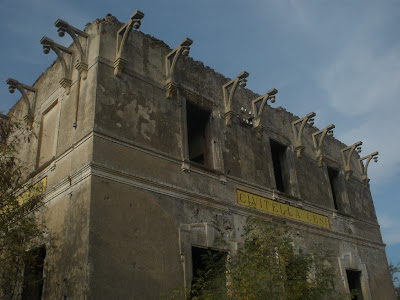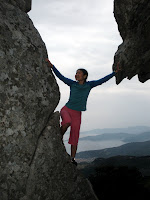
What do you do when the Italian government declared it too beautiful a day to be working in the office? You take your mountain bike and board the train. Seventy minutes later, I am in my happy place far far away from Rome. This is the hills of Capranica, where the 52-km bike tour starts. A few hours later, I will end up at Civitavecchia, a port city on the coast. The majority of the trail is an abandoned railway with the rails removed. There are eleven tunnels along the way, several of which are completely deprived of light, one of them as long as a mile. Aside from short sections of thick blackberry bush, occasional flooded tunnels, and muddy low crossings, the only real challenge that makes a solo trip difficult is the need to make a few portages over concrete walls. With the vow to make it all the way from the mountain to the sea, romantic scenery, and the rare privacy of total darkness, this is what I call a honeymoon trip – it all goes downhill from here.

After two pitch dark tunnels, a short detour takes you to the tiny medieval town of Barbarano Romano. Beneath the walled town are more than a hundred chambers of various sizes and functions dug into the hillside during the Middle Ages. Largely covered by vegetation nowadays, only about a dozen of them can be visited. Further hiking (about 2 hours) leads to caves with carvings of humans and animals, although a quick lunch with caffe corretto (corrected coffee - the Italian coffee is so strong that I have to dilute it with Baileys) and panino (sandwich) was more tempting in this lovely little town.

Abandoned train stations dot the trail. Many of them are choked by overgrown vines and are thus inaccessible. Except for one, Civitella Cesi. The stairs that lead to the upper floor, although missing a few steps here and there, are passable. Once up on the second floor, you are rewarded by the green vista of farmland and rolling hills. With a little imagination, you can almost hear the whistle of the approaching train in the wind and the golden waves it sets off in the alfalfa fields.

About mid-way, there is an abandoned water tower, empty of water but full of trash. The skeleton of a rusty ladder leads to the center of the tank. The 10-meter climb is far less scary than the mystifying eeriness of the vacant and seemingly bottomless water tank. Just a quick glimpse is enough to send me hurrying down the ladder like someone scampering out of a graveyard after seeing a ghost.

On the other side of the road is a path winding up a small rocky hill. Following the inconspicuous path, there are occasional steps dug into the rocks. At the top is an out-of-place white tent as big as a tennis court. Under the tent lies the excavation site of Luni sul Mignone, the oldest building found in central Italy: an Etruscan dwelling dated back to 12th century B. C. All the above-ground structures were long gone, but the steps, pillars and chambers dug into the rocks are still visible. An outcrop of the rocky cliff affords a panoramic view of the river valley a hundred meters below. For a rock climber, it is a delightful little playground, as handholds are already dug into the rock faces.

When there is half an hour of daylight and 25 more kilometers to go, I have to race against the waning sun. The last 18 km riding in the dark on the busy Aurelia highway is a little nerve-wracking but manageable. The biggest hills are encountered in the last few kilometers of the entire trip. Pumping up the last big hill pays off when I arrive at Civitavecchia Train Station three minutes before the train takes off. It is my regret not to explore the lively city of Civitavecchia, but that is just another reason to do this trip again.

This trip is also published in the Italian Notebook, where you can read about many other wonderful places and culture of Italy.






















